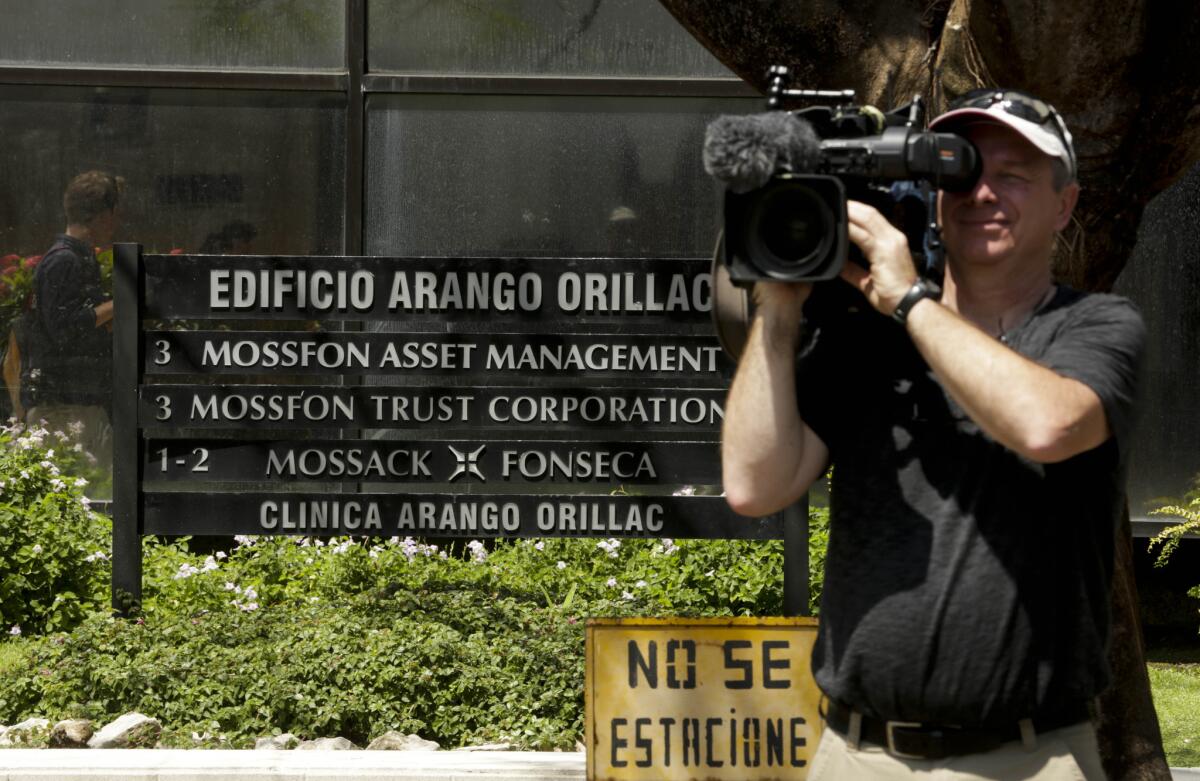‘Panama Papers’ blockbusters make waves abroad, but secret money is a U.S. problem too

A cameraman films outside the Arango Orillac Building--which lists the Mossack Fonseca law firm as a tenant--in Panama City, Panama, on April 5.
- Share via
The headlines about the “Panama Papers,” the gigantic trove of offshore records that surfaced this week, were all about the famous names connected to secret financial accounts: Russia’s Vladimir Putin, Ukraine’s Petro Poroshenko, China’s Xi Jinping, Syria’s Bashar Assad, Saudi Arabia’s King Salman and more.
But on second glance, most of the names weren’t too surprising. You didn’t really expect the world’s autocrats to keep their money at home, where it could be seized by whoever came next, did you? (And in some cases, the autocrats’ names weren’t really there; the accounts were held by family members or friends — in Putin’s case, an old classmate, a cellist with $2 billion.)
What was more striking was the industrial scale of the money transfers: almost 215,000 offshore shell companies, more than 14,000 clients, more than 11 million documents — and uncounted billions of dollars.
Nevada, Wyoming and South Dakota have all passed laws making it easier to set up shell companies -- and harder to identify the real owners.
That and the fact that the business of moving secret foreign money isn’t confined to steamy tax havens like Panama. Some of the money in the Panama accounts ended up in the United States, invested in real estate and other assets from Miami to Las Vegas. The firms that transferred the funds included major European banks headquartered in Switzerland, Luxembourg and London. And most of the shell companies formed by the Panamanian law firm Mossack Fonseca were set up in the British Virgin Islands, a possession of Britain.
“Those shell companies are being formed to buy property and open bank accounts in safe places — places like New York and Los Angeles,” said Sarah Chayes, a former U.S. advisor in Afghanistan who now works on global efforts to combat corruption.
“What that law firm did is just one step in a chain of corruption services,” Chayes told me. “And the next level outward includes people in the United States — lawyers, real estate brokers, other agents.”
Indeed, the United States is an active competitor in the “corruption services” business.
Nevada, Wyoming and South Dakota have all passed laws making it easier to set up shell companies — and harder to identify the real owners. Bankers say that has actually prompted a flow of foreign assets from traditional tax havens such as Zurich and Bermuda to less elegant banking centers like Reno and Sioux Falls.
“How perverse that the USA, which has been so sanctimonious in its condemnation of Swiss banks, has become the banking secrecy jurisdiction du jour,” Swiss lawyer Peter Cotorceanu wrote in legal journal cited by Bloomberg News. “That giant sucking sound you hear? It is the sound of money rushing to the USA.”
Some people think that “rushing” is actually good news for the American economy. High-end real estate brokers from New York to Beverly Hills have seen a flood of buyers from Russia, China and the Middle East.
“Wouldn’t it be great if we could get all the Russian billionaires to move here?” Michael Bloomberg said in 2013, when he was mayor of New York.
But if there are short-term benefits to anonymous money, the long-term picture is far less sunny. At least some of that money is undoubtedly the product of corruption in other countries. And corruption is one of the main drivers of instability and terrorism around the world, including the rise of groups such as Islamic State.
“Corruption is a radicalizer because it destroys faith in legitimate authority,” Secretary of State John F. Kerry said in a speech earlier this year. “No one knows that better than violent extremist groups, who regularly use corruption as a recruitment tool.”
Corruption also robs poorer countries of money for economic development. One respected research group, Global Financial Integrity, estimates that corruption costs developing countries at least $1.1 trillion a year — more than all the foreign aid and direct investment they receive from the rest of the world.
There’s no easy fix. Nobody’s suggesting that corruption can be eliminated. But there are at least two things the United States can do to make it harder for foreign investors to evade taxes or conceal the proceeds from corruption.
One is a practice European countries have already begun: Establish a “beneficial ownership registry” of the true owners of shell companies.
In most countries, the registry is designed to be easily accessible to any government agency investigating a violation of the law; in Britain, it’s intended to be open to the public.
A second, less ambitious reform: Require lawyers, real estate brokers and registered investment agents to follow the “know your customer” regulations that apply to U.S. banks. Thanks to energetic lobbying, those industries are exempt from the federal requirement to report dubious inflows of foreign money.
The Obama administration will have a chance to work on both of those ideas soon; British Prime Minister David Cameron is holding a global summit on corruption next month.
Cameron has a personal stake in a successful outcome. His late father, Ian Cameron, ran an offshore investment fund to help wealthy British clients avoid paying taxes in Britain. His name turned up in the Panama Papers, too.
Twitter: @doylemcmanus
Follow the Opinion section on Twitter @latimesopinion and Facebook
More to Read
A cure for the common opinion
Get thought-provoking perspectives with our weekly newsletter.
You may occasionally receive promotional content from the Los Angeles Times.










